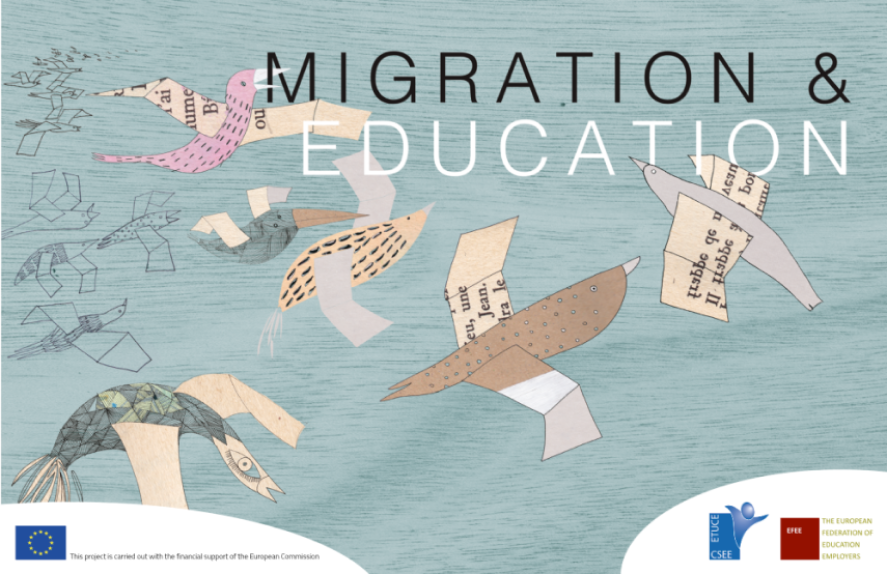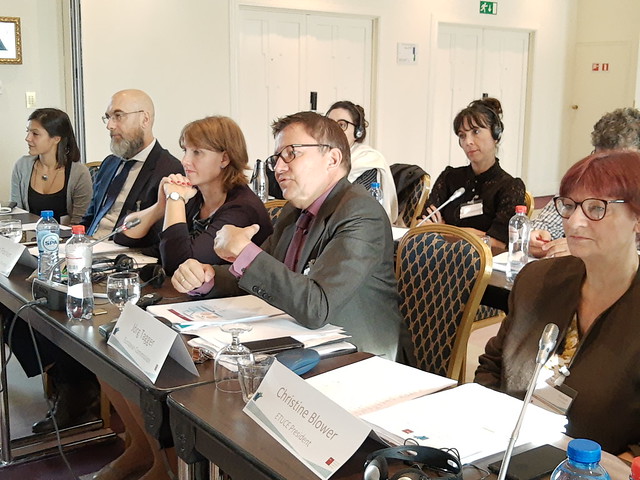Conference and European Parliament hearing mark the end of our project on social dialogue in education and migration
Published:
Education is both a fundamental right for all human beings and a powerful tool for social inclusion: two truths which must inform European countries in their response to migration and refugees. They also inspired a joint project on education and migration by education trade unions and organisations representing education employers.
How can education social partners contribute to the inclusion of newcomers in Europe? Last week’s closing conference presented the research and case studies gathered in the project. Then we took the message to the European Parliament for a public hearing and the premiere of our documentary Education Without Borders.
The two-day conference (14-15 October 2019) was the conclusion of ETUCE and EFEE’s joint project on promoting effective integration of migrants and refugees in education through social dialogue.
“This project doesn't just point out problems. It looks for solutions.” That is how Professor Nihad Bunar, the project’s lead researcher from the University of Stockholm, described his motivation to get involved. Indeed, the research which Professor Bunar produced over the last two years offers concrete case studies from Belgium, Serbia and Spain, shedding a light on the situation of migrants in these countries as well as the work that teachers and education trade unions are doing to foster inclusion.
Successful approaches are child-focused and supportive, integrating the children in regular classes as soon as possible while they receive additional support. In this context the first language of the migrant children is key. It should be used to underpin their learning and not seen as a barrier to the acquisition of the language of the host country. Likewise, it is important for teachers to have decent pay and working conditions, along with the tools, professional autonomy and opportunities for professional development that they need to guarantee all learners the required support. Successful inclusion is also directed towards families and requires engagement not just by schools but also by the community outside the educational sector.
Social dialogue can and must continue to play an important role in effective inclusion. For example, education social partners can ensure that policy discussions take note of the working conditions and professional needs of the teachers, trainers and school leaders who cater for migrants and refugees. These professionals are a fundamental part of any inclusion strategy, and they need excellent working conditions and professional development opportunities to be able to address the particular challenges of newly arrived learners.
ETUCE and EFEE members discussed Joint Guidelines for the effective inclusion of migrants and refugees in education. This kicks off discussions with a broader set of social actors and European policymakers about a possible Quality Framework for the Effective Integration of Migrants and Refugees. Both outcomes will be proposed for adoption at the upcoming European Sectoral Social Dialogue in Education Plenary on 2 December 2019.
On the second day we decamped to the European Parliament for the public hearing 'Migration and education: Humanity and rights or fences and hostility?' The session was hosted by MEP Pierfrancesco Majorino and gave an opportunity to premiere the new documentary Education Without Borders, which tracks the debates and case studies throughout the project. The film was warmly received by the audience and those who were actively involved in the project over the last years. It sheds a personal light on the richness and opportunities that newly arrived children bring with them when arriving in Europe, and shows a variety of approaches that dedicated education professionals are taking to support them in their integration.
The public hearing gathered representatives of ETUCE, EFEE and civil society organisations: SOLIDAR, PICUM, COFACE, the Red Cross, Eurochild. One of the main conclusions was that network building all over Europe is needed to ensure the integration of migrants into education, starting from a child-focused and rights-based approach to inclusion.
As ETUCE President Christine Blower stressed, “all children have the right to education, no matter their migration status. If more refugees arrive in Europe, we need a bigger table not higher walls.” This successful joint project shows that education social partners are committed to this vision and have a lot to offer in its implementation.
- Read the full report Promoting Effective Integration of Refugees and Migrants in Education
- Watch the documentary Education Without Borders.
